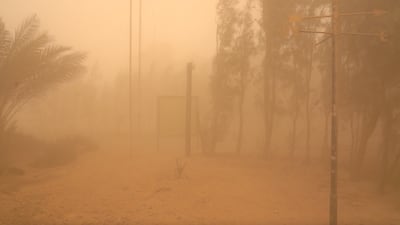Authorities in Jordan ordered schools in the south of the kingdom to close on Monday because of a sandstorm affecting the area.
The country's main university, Jordan University in Amman, also closed its doors as dust reduced visibility and made it difficult to breathe in the capital.
Official media said schools in the governorates of Karak, Tafila, Aqaba and Maan were closed because of the heavy spread of dust.
Uroub Al Abadi, a spokeswoman for the Ministry of Public Works, called on drivers to exercise caution because of a drop in visibility. She also warned of the danger of flash floods in wadis and low-lying areas.
The official weather service forecast sporadic rainfall in some areas on Monday, with the dust storm expected to clear by nightfall.
The rain could help cleanse the atmosphere as well as cars and buildings coated with dust and sand.
Temperatures in Aqaba, Jordan's only sea outlet, were forecast to reach a high of 34ºC on Monday, compared with 29ºC in Amman.
The weather in Jordan is usually temperate at this time of the year, attracting foreign visitors before the onset of scorching summers. Most tourists are drawn to the south, where famous sites such as the Nabataean city of Petra and Wadi Rum, a shooting location for the 1962 film Lawrence of Arabia, are found.
After a drop in arrivals over the past two years because of the Covid-19 pandemic, tourists numbers have been picking up this year following the lifting of health restrictions.
Kamal Inizeh, a tourist guide in Wadi Rum, said the weather there was clear on Monday, but added that tourist numbers were slightly down.
"It seems some people do not want to take the risk of being on the road in this weather," he said.








